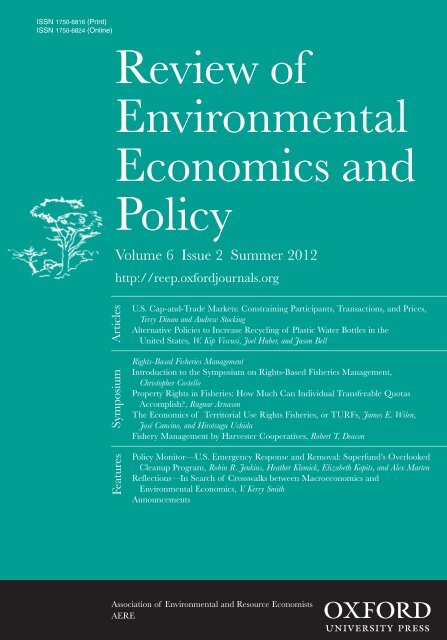碳税审查和更新:将美国气候政策的行为-学习-行为方法制度化
IF 6.6
3区 经济学
Q1 ECONOMICS
引用次数: 13
摘要
气候变化政策的设计必须解决一些关键的不确定性,包括气候变化的影响、碳税的经济性以及全球应对气候变化的努力。对每一个问题的定期审查将提供新的信息和分析,可用于减少不确定性,并为碳税的更新提供信息。本文提出并描述了一种简单、可预测的方法来审查和更新美国碳税。根据这种“结构化自由裁量权”方法,美国总统将建议每5年更新一次碳税,这将基于政府机构对与气候变化相关的环境、经济和多边条件的审查。按照以加快审议贸易协议为模式的程序,美国国会将同意对建议的碳税更新进行投票。这一过程也可以与2015年《巴黎气候协定》下减排承诺回合的时间安排相协调。我建议,将这种“行动-学习-行动”的碳税设计方法制度化,可以提高碳税的政治可行性,并提高其对不断变化的环境、经济和多边条件的适应性,随着时间的推移,这可能会增加净社会福利。本文章由计算机程序翻译,如有差异,请以英文原文为准。
Carbon Tax Review and Updating: Institutionalizing an Act-Learn-Act Approach to U.S. Climate Policy
The design of climate change policy must address a number of key uncertainties, including the impacts of climate change, the economics of a carbon tax, and the global effort to combat climate change. A periodic review of each of these issues would provide new information and analysis that could be used to reduce uncertainty and inform the updating of a carbon tax over time. This article proposes and describes a straightforward and predictable approach for reviewing and updating a U.S. carbon tax. Under this “structured discretion” approach, the U.S. president would recommend an update to the carbon tax every 5 years, which would be based on government agency reviews of the environmental, economic, and multilateral conditions related to climate change. Following a process that is modeled after the expedited consideration of trade agreements, the U.S. Congress would agree to vote on the recommended carbon tax update. This process could also be coordinated with the timing of the emission mitigation pledging rounds under the 2015 Paris Climate Agreement. I suggest that the institutionalization of such an act-learn-act approach to carbon tax design could improve the political viability of a carbon tax and promote its adaptability to changing environmental, economic, and multilateral conditions, which would likely increase net social welfare over time.
求助全文
通过发布文献求助,成功后即可免费获取论文全文。
去求助
来源期刊
CiteScore
10.80
自引率
0.00%
发文量
25
期刊介绍:
The Review of Environmental Economics and Policy fills the gap between traditional academic journals and the general interest press by providing a widely accessible yet scholarly source for the latest thinking on environmental economics and related policy. The Review publishes symposia, articles, and regular features that contribute to one or more of the following goals: •to identify and synthesize lessons learned from recent and ongoing environmental economics research; •to provide economic analysis of environmental policy issues; •to promote the sharing of ideas and perspectives among the various sub-fields of environmental economics;

 求助内容:
求助内容: 应助结果提醒方式:
应助结果提醒方式:


